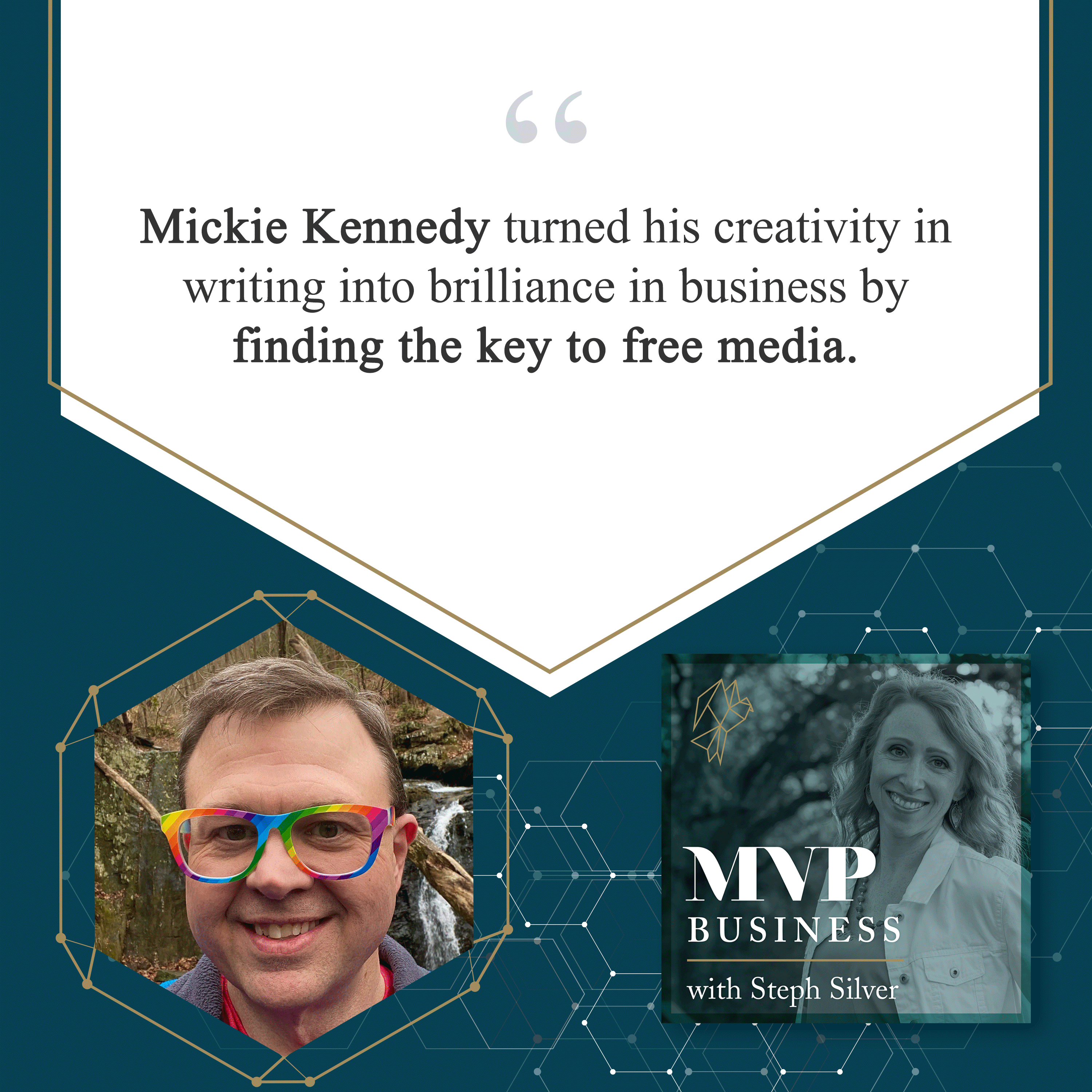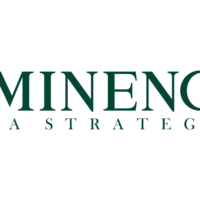Posted on May 8, 2023
Press releases are not just for big corporations. With the right approach, small businesses can access them to gain media attention, build credibility, and grow their brand. In this episode, we have Mickie Kennedy, Founder and President of eReleases, a leading small business press release distribution service. With over two decades of experience, Mickie is an expert at helping small businesses increase their visibility and credibility through PR. Today, he dispels common myths about PR and shows how small businesses can use press releases to achieve free marketing success. He shares valuable tips on crafting effective pitches, targeting the right audience, and distributing press releases for maximum impact. Mickie also shares his own journey from corporate America to small business success, and explains how eReleases has helped thousands of small businesses to grow their brand with PR. Tune in now and take your small business to the next level with PR.
—
Listen to the podcast here
Small Business PR: How To Succeed With Press Releases And Get Free Marketing Success With Mickie Kennedy
In this episode, our guest is Mickie Kennedy. Mickie is the Founder and President of eReleases, the small business leader for press release distribution celebrating 24 years in business in 2023. He is an expert at helping small businesses increase their visibility and credibility. He’s here to share some valuable insights with us. Thank you so much for joining us, Mickie.
You’re very welcome. I’m glad to be here.
I’m excited to talk about PR as it relates to small businesses specifically because most small businesses think that PR is out of reach. That’s why you got this started. Tell me a little bit about who you are and what you were doing before you started eReleases.
I was an MFA graduate. I got my degree in Creative Writing with an emphasis on poetry. That was my passion and I assumed I’d wait tables by day and write poetry by night. I did that for summer and my knees and ankles hurt. My mind was so zapped at the end of a twelve-hour shift that I wasn’t reading and writing so I was like, “I need to find a safe office job.” I got hired at a telecom research startup in DC as employee number three. I had a writing background so they said, “Figure out press releases, write press releases for us and send them to the media.” I did that and got good at it. We published a lot of international telecom traffic.
I would look for anomalies like, “Why does one country in the Caribbean generate more telecom traffic than all others combined? 1-900 call center headquarters were there.” I would turn those into stories, write press releases and fax them to the media. We got picked up in the Economist, Financial Times, Wall Street Journal and Washington Post. We were hitting what I considered home runs again and again.

At a certain point, journalists started to email or call and say, “Could you email us the press release going forward rather than faxing it? It’s so much easier to work with the numbers and the text and stuff like that.” I found it so much easier to send an email blast than it was to do all day faxing to 150 journalists with the screeching fax machine if anyone remembers what they sounded like.
A light bulb went off and said, “I could be a matchmaker and send press releases to journalists by email.” I spent a year in my off time, which wasn’t considerable because I was working for a startup. I reached out to journalists and asked if I could email them releases related to their beat. Almost all of them said yes. I launched about a year after that with 10,000 journalists in my database and that’s what I did.
I was the matchmaker matching press releases to journalists. Over time, PR Newswire reached out to us and said, “You should consider adding us to your distribution.” I’m like, “My clients pay a few hundred dollars. You charge as much as $1,500 for a 500 or 600-word press release to go out nationally.” Surprisingly, they liked the audience that we had, small businesses, entrepreneurs, a lot of solo individuals, speakers, authors and things like that.
They know that their sales team would never reach out to people like that because they don’t represent enough volume. Acting as a coop, we negotiated bulk pricing. We have a customized national distribution that all of our clients get. That’s how it happened. I’m a poet that casually found himself doing business. It’s been a lot of learning experiences over those 24 years. I feel I’ve done a pretty good job from a business standpoint. I’ve been able to rely more on my team and focus a little bit more energy and time back on poetry again.
Do you think that working at the tech startup helped to put together that or think about the database differently or is that part of your personality? A lot of writers and artists are very creative but they don’t have that organized technical sign.
I didn’t have Excel spreadsheet experience or database experience until I started that job. We were using FileMaker Pro for database stuff. I did get comfortable using products like that and I saw how they could apply to the eReleases by keeping a database of journalists as well as emails, which initially, I was doing myself blasting emails and then using a listed company over time.
It aligned there and gave you a little bit more confidence in that direction probably too. I remember my first real job. I was a Theater major and also was prepared to wait tables for the rest of my life. I quickly decided that that wasn’t what I wanted to do either. I got a job at a restaurant as their Director of Sales and Marketing. I started putting out press releases to eReleases and PR Newswire because, at the time, they were free or close to free. I remember back then if you got even the internet distribution that those guys and a couple of others provided, that in and of itself was so beneficial. You touched on this a little bit but what’s your advice for not only getting the information out there but getting it picked up?
The real key to getting picked up is being newsworthy. That’s when most small business owners and entrepreneurs throw up the white flag and say, “We’re not important enough.” There are ways in which you can create your newsworthiness or data. For example, I always advise my clients who aren’t having a good time to do a survey or study within their industry. You use SurveyMonkey with 4 questions per page for 4 pages. That’s sixteen questions and ask things that are relevant that people would want to take your industry’s pulse on.

Free Marketing: The real key to getting picked up is being newsworthy. That’s when most small business owners and entrepreneurs throw up the white flag and say, “We’re not important enough.”
“What’s your marketing budget over the next two quarters look like? Are you spending more or less? Are you holding off hiring? Are you having challenges? A lot of people with workplace balance want to work from home, is that an issue?” You can ask questions like that but you can also ask things that are a little more industry-specific that are going on. Generally, anything that you talk about at a trade show or conference is potentially a great question because everyone’s always curious, “Are you having this experience?” We are and that’s a great question that you could ask and get people’s pulse on. The first roadblock I hear from customers when I tell them this is I don’t know who to send it to. There are, in every industry, dozens if not hundreds of trade associations.
Pick a smaller or an independent one and tell them that you’re doing a survey, you would love for them to share it with their members and that you will mention them in a press release you’ll be issuing over the wire. A lot of them see that as a win-win. I’ve had huge success doing that. Almost every time, a client asks a smaller independent trade association and they generally say yes.
Sometimes, they might push back and say, “Could we co-brand the survey?” Get a little more recognition for them and I don’t see that as a downside. Once you’ve generated the survey, you analyze the results, what were the surprising ones and what was the big a-ha moment. Write a press release around generally 2 or 3 things that were intriguing that came out of the survey. Put some amazing quotes in there that your analysis of why you felt the survey trended a certain way.
All of a sudden, you’re a thought leader in your industry and you’ve established some authority. Generally, these surveys when they go out get as many as 8 to 14 articles written about them. It might be less depending on your industry but often, it generates real articles and it works almost every single time. I’ve only seen it not work once and it was a customer who asked one question in their survey. It was a dating site and they asked, “Do you like tall men?” I was like, “That was such a missed opportunity.” They had an intriguing audience but the fact that 89% of the people said, “Yes, we prefer taller men,” isn’t an intriguing question. That’s the only time I’ve ever seen it fail.
It’s not a surprising answer either.
It’s not. The surprising answers are the ones that people like. You don’t have to ask multiple-choice questions. In one survey we did for a local auto repair shop in Pennsylvania, we asked the question on the last page, “What’s the strangest thing a customer left in their car while being repaired?” We decided to go with that because it wasn’t statistically relevant but we got a lot of funny anecdotes of people. Someone left a boa constrictor. Someone left an urn with their mother in it and they had to retrieve her for a memorial and all kinds of little quirky things. That did well.
It got picked up in a lot of auto industry trade occasions. We published the top 50 that we thought were most intriguing but they picked and chose which ones they wanted to share. They mentioned the company and the survey. Always build a resource page on your website with all the questions and answers and lots of resources related to that survey. In the case of the auto industry trade publications, they linked to that and that link from the authority site is extremely valuable. That was one of the chief goals that we had with that campaign because they had a new domain name that they weren’t ranking for and they were trying to quickly establish themselves and get traffic. It worked well for them.
What have you seen some of the biggest missteps of why press releases don’t get picked up or what doesn’t work for small businesses?
People look for inspiration about what press releases they should write by looking at others in their industry. It’s probably important to know that 95% of all press releases don’t result in any earned media. Those links where it posts press release gets replicated on several websites. That’s cool but that’s not important. The traffic from that is very minimal. What you are looking for is an actual journalist writing an article about you. One of the biggest or most frequent press releases that we get is an employee change like a new hire or something like that. Those rarely result in earned media. You might get a little pickup in your trade publication, maybe your local newspaper but that’s about it.
They’re not going to be very large articles or on the move and here’s this person. I always say if you have something that you want to get out of, do it yourself. There are probably less than 3 or 4 places that’ll write about you. Do a little bit of legwork. Find out what their email address is, send an introduction and say, “Here’s a personnel change we had that I wanted to share with you,” your local newspaper if you’re looking enough to have a local business magazine or business newspaper and then 1 or 2 trade publications. Build your Rolodex over time because that can be a valuable way to save your dollars for going over the wire for more significant news.
Another thing that I see a lot of small businesses do is they have an Imposter syndrome where they don’t feel important enough that press releases aren’t going to be for them. What you need to realize is journalists are gatekeepers and they’re looking for an intriguing story that they can share with their audience. If you can develop a newsworthy story or intriguing story, often, they’ll want to share it. What journalists don’t like to do is they don’t like writing articles about the big giant Google of the world and Microsoft because they know they can advertise. They want to be seen as curators and expose smaller businesses or little discoveries. Don’t feel that being small is a handicap. In many ways, it gives you an advantage.
Don’t feel that being small is a handicap. In many ways, it gives you an advantage. Click To TweetThat’s why startups do so well with PR because they’re small but they’ve honed their story and sometimes they’ve founded the company. Usually, an inspirational story might include obstacles and vulnerabilities. Those relate very well and they translate into articles because people do like the story arc. Journalists like to write a story arc. If you are going to do for example a product launch press release, which is another popular press release we get, you have a new product, a new book or something like that, including stuff in there that can be turned into the elements of a story.
Many times, it’s like, “Here’s the product and a list of features.” Instead, “Here’s someone who used it, this was their experience and this is a quote by them.” All of a sudden, you have the product, someone’s experience with it, the results that they saw and a quote. It builds out the article almost from the beginning by having those elements there.
If it’s a book or something like that, sharing what the book’s message is about or a quote from other people talking about the book. Books are challenging but there are ways in which you can reverse-engineer a story that journalists would find intriguing. If you can build some of those elements and put those touchstones in the press release, you have a much higher chance of getting media pick up.
Let’s talk about books a little bit. With businesses, there are trade publications, business general or generic. There are local newspapers and all sorts of different things and places that you can look to specifically for business. First-time authors or self-publishing is popular. Most people don’t know where to go to promote their books. What would you suggest are the best ways to get a new book for a first-time author out in the world?
If it’s non-fiction, I would hone in on what your message is, how it differentiates itself from other books in the industry and what your hook might be. That’s why a lot of inspirational business books have a little catchphrase on the cover of the book. Everything that’s told is through the context of that catchphrase. What is your hook? What makes it different? Share that.
Also, share your story. Being authentic and vulnerable is a powerful way for a journalist to build a story around the author. It could be your hero’s journey or who your enemy is, all different types of things but being vulnerable is one of the most important things that you can do. I’ve had that work well. I had a self-published author that got picked up on the front page of the entertainment section of USA Today. That’s a big get for someone who self-published. It was because they had built in a story that was interesting about what their experience was and it did well.
When you’re dealing with fiction, it’s a little bit harder because you’re talking about the elements of the story but you don’t want to give too much away. A lot of fiction is based on the style of the writer and it’s hard to convey that. In cases like that, if you have other people or recognized authors who have a blurb or a quote, those are things that you can incorporate in there as well. Also, don’t underestimate your local media. Reach out to them and share what you’re doing and the book. Also, reach out to local bookstores. Even the chains offer to see if you do a reading or a book signing.
Often, on non-busy nights, you can pitch it like, “I will promote this and bring an audience on whatever your non busiest night is. Look at your calendar.” They’ll see that as a win-win. They’re like, “Maybe this guy will bring a few dozen book buyers into the store and that would be great.” There are calendars that your local news calendars like newspapers and Facebook has local calendar events. Make sure that you put your book reading or book signing in there.
There are lots of ways to try to promote your book signing and get the word out. Let them know that you’re willing to do that marketing for your event and get some local news. Once you have someone write an intriguing story about you, often, a good journalist can comb out a story that you can then take, polish and incorporate into your strategy.
You mentioned local media. A lot of cities have their local morning shows where they sit on the couch and talk to somebody local about what’s happening. I’ve seen a lot of authors get on those morning shows. What is the best way to reach out? Part of it is having that hook. You have to have something newsworthy but otherwise, how do you get noticed and get seen or even find that information?
If you know of a program and you’ve seen it before, call the station and let them know that you’re trying to reach the producer or booker of that segment on that program and who would you talk to. They’ll often put you in touch with that person. They’ll want to give you an email address so you can send your stuff over and they can review it.
Once you’re armed with that email address, you can then reach out to them. You don’t have to write a press release. You can share a pitch or a few sentences about what your book is about, what you’re about or what you’re trying to promote. This works with anything and why their audience would find it intriguing or interesting. What you’ll find is it may not work but you can also do this over time.
I have a lot of clients that reach out to their local market. They have less than ten contacts that are in their industry or would cover a business like theirs. They reach out to them quarterly and share a pitch idea that they have. Sometimes they come back with a yes. Even more importantly, once you’ve done this for a couple of years, you’re in their head.
When they’re working on a story and they think of you, they’ll go, “Let me find that email and reach out to them.” I have clients who say, “I don’t have to do the outreach anymore. They come to me every time they have a story about my industry because they know I can provide a great quote.” Do realize that quotes are a huge opportunity for you to say something intriguing, concise or powerful that can’t easily be paraphrased.
Quotes are a huge opportunity for you to say something that’s intriguing, concise, or powerful that can’t easily be paraphrased. Click To TweetThere’s a reason journalists like to quote someone. It’s like, “Here’s someone who said something in a way that is intriguing, exciting or controversial.” Don’t be afraid to write a powerful quote. Many quotes are safe. They look like they’ve been written by a committee. You want to stand out with a quote. The quote is a great way. If you’re pitching journalists to local media, having a readymade quote relevant to your pitch is a great way to stand out because if it’s a great quote, journalists can build a story around it. They’ll come up or ask for the rest.
They’ll do the interview after that or the same thing with a headline. I love all that information. One of the things that I was thinking about is the restaurant that I had worked for before. They started by putting out these releases that had internet pickup. Once you get out there, you’re regularly pitching and trying. I sent it directly to all the local media through their email addresses and things like that. Eventually, they knew that I was out there trying and they could see what my angle was.
They started referring me to our restaurant and other organizations. We got crazy things like the Bachelor and Bachelorette and stuff like that. We would film on site, get that press, notice and all these different things that I never would’ve thought of. That’s one of the benefits of putting yourself out there and continually having conversations with the press in different ways. You never know what they’re going to see as the hook, come back and bring it back to you.
Being creative works well. There are lots of ways to get a story and promote a story and everything from being a contrarian popular subject. Everybody agrees when there’s a popular subject in your industry. Everybody is going with the flow. You don’t stand out by doing that. If you either don’t agree with it or you’re willing to stick your neck out and be the friendly jerk and say, “Here’s the downside to this,” you stand a chance at being inserted in every article about that because journalists like to be fair and balanced. Often, they only go to print with one view because no one is raising their hand and saying, “I have a different view on this subject.” If you do, they’ll likely plug you into stories about that because you represent the other side or the downside of this.

Free Marketing: Being creative works well. There are lots of ways to get a story and promote a story and everything from being a contrarian popular subject.
With that, if you’re paying attention enough in your industry, you can say, “I don’t necessarily disagree but here is the downside and how you can stay away from it.” Having that, being plugged in, knowing what to say and how to get around being the one that gets noticed. You’ve had this business for 25 years. Is it almost 25 years or is it 25 years?
It’ll be 25 years in October 2023.
Congratulations. That’s incredible. That’s wonderful. What have you learned? What would you have done differently? What has been your biggest mistake so far?
I hired people late because I was afraid to take on a salary for someone else. I was like, “What if we have a bad month? I would feel terrible.” By the time I hired someone, I should have hired 2 or 3 at that point but I waited way too long. Over time, we would lose most of our employees after about a year. I was like, “It’s English majors. Most of the time, it’s their first job. They don’t want to stick around.” I was never happy with the turnover and the employees either. I was part of a marketing mastermind and I would complain about it.
This HR consultant who’s also part of the marketing mastermind says, “Mickie, I’m getting tired of you wasting your time every time you come to the marketing mastermind talking about your HR problems. I don’t do this for small businesses but I’d be willing to interview your customers, your staff and figure out what’s wrong with them.” She did and then she came back to me and said, “It turns out you’re the problem. You’re a micromanager and the employees feel like they can never do anything right and that you’re always behind their back combing through everything to find every little mistake that they make.”
It was true. I tried to correct it but I found that after a couple of weeks, I was still in my old habits. I’m a perfectionist entrepreneur. I went into business because I don’t necessarily work well with others but I wanted to be in charge of my destiny. I decided at that point to put someone in charge of the staff and work from home. I focus more on marketing. I’m more of a cheerleader now for my staff.
That was in April of 2015 when I went home and everybody that was there at that time is still there. We went from a one-year turnover to the people that were there and are now still there. It’s cool and exciting. Some people might have been offended at being told that they’re the problem. I don’t know. I approach business as trying to solve things and figure things out. My approach with marketing as well is, “How do we accomplish our goal? How do we make it better?” I love to do this improvement through small incremental changes.
I learned that with A/B split testing of landing pages years ago and I’ve been able to adapt that to lots of little things in my business. “Maybe we should do this for all of our customers, like rewrite their headlines.” We tested it and saw how the people did. We used to send this crazy shock-and-awe package where it was a box of fun for every new customer. It was about $50 but I felt like it was a big investment in the customers. One came back to me and said, “I felt it was a little unprofessional. It was silly.” I split test that for six months sending half the new customers and the other half is a book with a welcome letter.
I looked at the lifetime value of both populations. For the people who received the book, their lifetime value was three times of the people who received the shock-and-awe package. There was something to that. There was something that made them not feel comfortable working forward and using me again. These are little lessons you’re open to testing and figuring stuff out in your business. Analyze the data, make sure you’re statistically relevant and make decisions based on that rather than your emotions. I’m pretty good at running my business without emotions and being able to let the numbers speak for themselves.

Free Marketing: Analyze the data, make sure you’re statistically relevant, and make decisions based on that rather than your emotions.
I know a lot of people, especially small businesses. In larger businesses, you have a board or several people that are running it and you can’t let the emotions run. Even in those larger organizations, a lot of people are emotion-driven. They are told by their peers what they’re seeing more often. When you’re the leader, you’re more likely in a small business to have that big blind spot. If your team isn’t willing to be the one to tell you what’s wrong, then you have to be open to that outside perspective. The other thing I see beyond running with emotion is running with your intention and intuition, which can be good.
Sometimes that’s successful but over time, if you’re not doing the A/B testing, running with data or asking for outside influence, then you tend to get stuck. You don’t make it to that 25th year because you are running behind everyone else and wondering why but you’re not asking the right questions. Maybe your team doesn’t feel safe telling you the answers but they would feel safe telling it outside. They got to be anonymous.
Even if it’s a small team of 5 to 15 people, they can say, “They think that George down the hall said it.” It’s easier to tell that outside resource that they feel micromanaged or the conversation inside. The hours or whatever it may be is holding them back a little bit from going from a 1-year employee to a 10-year employee. That’s incredible. What a huge change. What has been the hardest decision you’ve had to make over this time?
The hardest decision for me was letting go. Working from home, I felt like I was losing control and I was but I also had to rely on other people. For a business to work and grow, you have to be reliant on others. I always was there wiping someone’s chin or finishing their sentence. You have to let them succeed or fail on their own. That for me was difficult but it was necessary because it allowed me to focus on growing the business. We probably tripled in size since then by me being free to focus on the things that matter in growing the business and letting the staff handle the day-to-day operations under the leadership of a managing editor.
What did you put into place or did you do with quality control? It’s the reason why you thought you were micromanaging. Did you put anything into place or work with your manager to help ensure that those details were not being missed? It’s scary letting go of either practices or different tools that you used.
We wrote down all of our business processes and had everyone get together and try to optimize them. “Do you agree that this is the best way to onboard a new customer? Are there things that we could do that could improve it?” We would test those. It’s like, “We’re going to take a population and as they come on board, we’re going to do this.” We’re going to look at that and see if there’s a difference between the way we’ve always done it.
Allowing them to be in charge, making suggestions and being open to improvements that they come up with, approaching it from being open and willing to test everything has worked out well. We have a great managing editor. She’s like a mother figure. She’s more encouraging than critical but she’s also there to help people who are having troubles and problems where my personality didn’t gel with that mindset. Another reason it succeeded so well is I have that great person who’s my ally from the business standpoint but also an ally for the employees as well.
Do you have any practices that you’ve put in for cultural cohesiveness to have a team that stayed for that long? Was it organic? Is there a hiring process that gelled all the right people at the right time?
This was something else I found with the HR consultant. She says, “Going forward, you should hire for customer service 1st and editing 2nd.” It’s because everything had been, “We want the best editors and the people who perform the best in the editing tests.” She felt like from the customer’s standpoint, they were less concerned about whether every error or comma was perfect in their press release and more concerned about how they were treated and the interactions back and forth. We started hiring and we doubled the staff since 2015. We have new people. We looked for people with strong customer service skills.
There was an English major who only worked retail and was trying to break out into something that used their skills a little bit more. I thought that was a perfect person because they had worked since ‘15 in retail and demanding customer service positions. I was right. They are great with customers and interacting with people. Figuring out what you should be hiring for is one of the things that I developed over time.
Figuring out what you should be hiring for is one of the things an organization has to develop. Click To TweetI was initially wrong and I was hiring people that did well on the test, care how they interacted with people, what their customer service skills were and what their social skills are. Sometimes, you can get a brilliant English major but they’re shy and it’s hard for them to pick up the phone, call a customer and ask a question. That’s something you have to be mindful of.
I agree with everything that you said. If anyone is going to be customer-facing, then it’s customer service first because all those skills can be learned, taught and honed over time. An error here or there can be overlooked versus somebody not feeling good about you. That’s quick, especially for the type of service that you provide. They can go anywhere and get that or maybe they feel they don’t need it. They want to make sure that they feel good.
I love that you hired the retail experience. You and I both had the experience of waiting tables and going to work. When I see resumes, young people come in and feel like they don’t have a chance but they have all this experience. Waiting tables, bartending or whatever working in retail, one of the things I ask is, “Do you find yourself being pulled into leadership positions or automatically doing extra or are you always doing the minimum?”
That’s where I see the difference in service. If you’re looking at a resume that’s all customer service and not quite into the industry that they want to be in yet, is it because you’re not willing to go the extra mile or nobody has given you that leg up yet? I read an article and it made me cry. It’s about a woman who was working at fast food somewhere. A president of a bank would go in and get his lunch regularly. The woman was always very upbeat and helpful. Everybody knew her.
He asked if she wanted to have a job at the bank as a teller. She did. She ended up working there for ten years. The gentleman who asked her to work for the bank, she had him give her way at her wedding because he changed her life so much. She didn’t have a college degree but she had the service, the attention to detail and the love of life that made her successful. Whatever she did, she didn’t think that she could take that next step because she didn’t have the education or the family background to get her there.
That was a bit off-topic but from a business standpoint, who you give opportunities to and who you hire is a very big deal. Especially when you are a small business getting started, most of the time, the biggest obstacle is the founder. If you are taking that leap to get outside and pushing yourself beyond the micromanaging or the holding on, then the next step is hiring. It can be a very scary step. Knowing when, how and who to hire is a big deal. Would you go back and do anything differently?
Other than learning that I was a bad manager quicker, that would be good. A lot of my mistakes are part of the path forward. You learn from them and move on. There’s not a lot I would do differently. There is always hindsight. If I did that situation over again, I probably wouldn’t have done exactly that. I feel like I’ve learned a lot from my mistakes. Things are positive and going well. I’m in the position I am now because of all the steps I’ve had up to this point.
A lot of the mistakes you make are part of the path forward. You learn from them and you move on. Click To TweetIf you were going to give advice to someone who thought they have this passion, they want to start a business, they’re going out and doing something on their own, what advice would you give to them?
Start small and try to be as frugal as possible. I have seen one who took out a small business loan to start a business and immediately hit up almost $8,000 in legal fees, incorporating, hiring consultants and all kinds of stuff. At the end of the year, all the money was gone. It was a $25,000 loan and they had nothing to show for it. They didn’t have a business yet. I’m a big proponent of starting a side hustle, seeing if it’s got legs and growing it. When I started eReleases, I paid a hosting company $3.95 a month for a website. In 2023, I spend probably closer to $3,000 or $4,000 a month in hosting fees. It changed but I started very small and I was able to work very lean.
I paid a company $30 or $40 to be able to run credit cards at a merchant processing early in the merchant processing many years ago. That was pretty much my hard cost. I did a lot of networking. There were bulletin boards that were big years ago. I would offer advice to people on what had worked for me in building out press releases, working with telecom data and what potentially they could do.
People saw me as an expert on these boards and shared me around to put the work in and progressed forward. It took a while for it to work but I kept seeing incremental changes in making improvements rather than reacting blindly. There were early years when I would do a new campaign and all of a sudden, I had spent $400 in a week and I didn’t get any customers from it.
My gut was telling me, “Kill the campaign. Stop it.” I’ve been taking a marketing class and they said, “You need to have statistical relevance and a certain number of clicks before you can decide that they’re not going to convert.” Once I calm down, I started analyzing the data and split-tested the existing one that does work and the new one. We will eventually see whether this one improvement is stronger or weaker. That put me in control. It calmed me down and I started reacting more intellectually over emotionally to things.
How long did you give that campaign? Did it turn out to be successful after all or not?
You have to have an A/B split test from a paid advertising standpoint, at least 30 conversions on one of them that has the equivalent traffic to the other and then it gives you an 80% probability of the campaign that’s in charge at that point being the winner. You get better when you have more numbers. In my business, I was looking for the bare minimum because I wanted to make decisions quickly and early. If one was 30 conversions and the other one was 28, it’s probably not statistically relevant but if one is 30 conversions and the other one is 4, we know that the one that’s 4 is dead in the water. It’s not going to come back to life.
Thank you for that example. Now that you have been doing this for many years, what is next for you?
I finished my first manuscript of poetry so I’m trying to get a publisher to get that out. It’s always slow going because responses for manuscript submissions usually take up to a year and then if you’re selected, it takes another year. It’s a slow process. I’m beginning to develop and work on a second manuscript. It’s pretty much it. I’m continuing to support and be a cheerleader for my staff. We do two weeks at the beach every year.
It’s a great retreat where we can all socially interact and build more of a cohesive bond between us. I tried that as an experiment and it’s worked out well. People look forward to it. I’m not in the office every day so it’s a great way for me to get to know them and they know me as the friendly boss who’s cooked some dinner most nights at the beach as opposed to the taskmaster who was always critical before.
You offer a free masterclass. Can you tell us a little bit about that?
I have put together a free masterclass that gives you an audit of all these strategic ideas that you potentially could do press releases on for your business. It allows you to build a PR campaign of newsworthy press release ideas. Survey study one is a cornerstone but I do recommend anybody who’s new to PR or wants to learn a little bit more to start here.
Starting with the most strategic types of press releases you could do will give you the biggest bang for your buck as far as getting media coverage and having a successful PR campaign. It’s at eReleases.com/Plan. It’s free. I’m trying to educate customers and get people to do more strategic types of press releases because they’re going to have better results to hopefully use us more and more.
Thank you so much for your time. Is there anything else that you want to share?
If you’re considering press releases, feel free to visit our website. There are a lot of resources there at eReleases.com. We don’t have any salespeople. It’s just editors. If you call, chat or send an email, you’ll be talking to an editor. We have no bots or anything like that. I do recommend people who are open to it to explore it and have a conversation.
If you write a press release, you can always email it to us. We’ll take a look and give you some advice, usually in a business day or two at no charge, whether you use us or not. PR is one of the most overlooked marketing channels for people. It can be a valuable asset to your business, especially if you’re watching dollars and trying to stay lean because you don’t have to do a $5,000 ad campaign. You could do a PR campaign for a few hundred dollars at a time.
Thank you so much. It’s valuable information. A good PR can change a business overnight. Thank you for joining us and for reading. If you liked it, tell your friends. Follow us on Instagram and LinkedIn. The mission of this show is to dig deep into the lives of true leaders so that others can follow, knowing that the path isn’t always easy but the journey is worth it. Enjoy the day and live with passion.
Important Links
- eReleases
- eReleases.com/Plan
- Instagram – @VineBrands
- LinkedIn – VINE Collection




